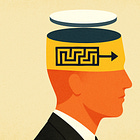The Tyranny of Infinite Optionality
Explore how boundless choice in cognitive capitalism liberates yet overwhelms. Learn why deliberate constraints and selective focus are essential for clarity, mastery, and sustainable cognitive work.
We live in an age of endless possibility. Careers are no longer linear, constrained by geography or traditional paths; the rise of remote work, gig platforms, and AI tools promises the ability to “do anything.” Side hustles, passion projects, and automated workflows coexist with full-time roles, giving individuals unprecedented freedom to experiment.
With infinite options comes a subtle tyranny: choice, once liberating, can now paralyse, fracture focus, and undermine the very sense of purpose it was meant to empower.
Optionality was once scarce.
A single job, a fixed career trajectory, or limited educational pathways imposed structure. Decisions were easier to make, focus was natural, and accountability was tangible. Today, the exponential proliferation of opportunities creates a cognitive burden. Every decision—from selecting a client project to choosing a productivity tool, from exploring a start-up idea to initiating a side hustle—demands attention, evaluation, and prioritisation. The mental energy expended in navigating these infinite paths comes at the cost of depth, mastery, and often, personal satisfaction.
This paradox is compounded by the illusion of control. AI and automation promise to accelerate experimentation, test ideas, and optimise outcomes. Suddenly, anyone can launch a business, build a product, or develop a tool with minimal upfront cost. The horizon of potential action expands constantly. Yet, in practice, the human mind struggles to sustain deliberate focus amid the flood of “possibilities realised in parallel.” The freedom to pursue everything can quickly translate into the pressure to pursue everything, leading to scattered effort, fatigue, and indecision.
Psychologists have long noted the paradox of choice: unlimited options can increase anxiety, reduce commitment, and heighten regret.
Cognitive capitalism magnifies this effect at scale, turning potential liberation into systemic stress. As mental labour becomes the primary asset, the cost of cognitive overload rises. Workers must now navigate not only external demands but an internal menu of near-infinite potentialities, each with its own promise and risk.
The tyranny of infinite optionality is, in short, the challenge of freedom itself. It is not merely a psychological quirk; it is a structural feature of the cognitive economy, shaping how individuals allocate attention, manage energy, and pursue meaningful work.
The question is urgent: how can one exercise choice without being consumed by it? How can freedom in the age of cognitive capitalism remain a tool for human flourishing rather than a vector of distraction and anxiety?
In this issue of Brewed for Work, we examine the hidden costs of boundless choice in cognitive capitalism. Gig platforms, AI tools, and remote work promise freedom, flexibility, and opportunity—but they also fracture attention, dilute focus, and generate anxiety. We explore how infinite optionality shapes modern labour, the psychological toll of pursuing “everything,” and why deliberate constraints may become essential for sustaining creativity, decision-making, and meaningful engagement in a world where the mind itself has become the primary asset.
More posts from this series:
Today’s Issue at a Glance:
The Promise of Optionality
From Scarcity to Overload
AI and the Exponential Menu
Paradox of Freedom: Paralysis and Anxiety
Anchoring Optionality: Towards Chosen Constraints
So grab your favourite mug, and let's get brewing!
Welcome to Brewed for Work, 🔒subscribers-only🔒 offering by The Percolator dedicated to professional growth and upskilling. Each week we share essays, insights and resources to aid you in your work-life.
🚀
Now, you can Upgrade your Subscription for Free when you Invite your Friends to Subscribe to The Percolator
Optionality is a prized concept in economics, finance, and strategy. Nassim Taleb popularised it in the context of investments and risk: having options is valuable because it allows upside while limiting downside. In life and work, however, the dynamics are less straightforward.
Cognitive capitalism has multiplied our options to the point that choice is no longer a simple advantage—it is a cognitive challenge.
Every career decision, project initiation, or side venture competes for attention, energy, and focus, creating an environment where unlimited possibility can paradoxically feel constraining.
Historically, scarcity structured decisions. A fixed career path, local opportunities, and finite technological means imposed natural constraints. Workers could invest deeply in a single skill, role, or project, building mastery over time. Today, the landscape has exploded. Remote work enables global collaboration; gig platforms allow simultaneous income streams; AI tools accelerate experimentation, allowing anyone to launch products, services, or ventures with minimal upfront effort. The sheer breadth of possibility transforms the nature of cognitive labour.
Focus is no longer simply a matter of discipline, it is an act of selection within an ever-expanding menu of potential actions.
Psychological research underscores the consequences. The paradox of choice, first articulated by Barry Schwartz, demonstrates that an abundance of options increases anxiety, reduces satisfaction, and can even impair decision-making.
In the context of cognitive capitalism, these effects are magnified: not only must workers choose which tasks to pursue, but they must constantly evaluate which opportunities are worth their finite cognitive bandwidth.
Indecision becomes a form of labour, consuming attention and eroding the mental flexibility that optionality was meant to enhance.
The stakes are practical as well as cognitive. Pursuing too many options leads to superficial engagement, incomplete projects, and shallow learning. It undermines long-term skill development, coherence of strategy, and even personal well-being.
In contrast, deliberate constraint—choosing where to focus, which ventures to commit to, and which cognitive pathways to ignore—emerges as a critical survival skill. Freedom without anchoring is not liberty; it is distraction.
Cognitive capitalism rewards those who can select and prioritise with discernment, balancing exploration with depth, experimentation with focus.
The tyranny of infinite optionality is not a lament against freedom, nor a nostalgia for scarcity. It is a structural reality of the modern knowledge economy, where mental effort has become the primary currency. Understanding this reality—its cognitive demands, psychological effects, and practical implications—is essential for navigating work in the 2020s.
Only by recognising the hidden costs of boundless choice can individuals cultivate the discipline, focus, and deliberate constraints needed to transform potential overwhelm into strategic advantage.
🏅
Keep reading with a 7-day free trial
Subscribe to The Percolator to keep reading this post and get 7 days of free access to the full post archives.





